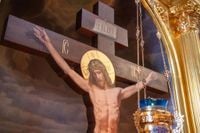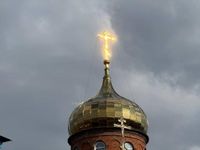Holy Week, or Passion Week, is a significant period in the lives of Orthodox Christians, marked by solemn remembrance of the final days of Jesus Christ's earthly life, His crucifixion, death, and burial. In 2025, this sacred week spans from April 14 to April 20, culminating in the celebration of Easter.
The spiritual essence of Holy Week is profound. The Church refers to these days as "Great" not because they are longer than others, but due to the magnitude of the events commemorated within them. Each day is imbued with deep spiritual meaning, guiding believers on a journey with Christ from Bethany to Golgotha. The Church's services during this week create a unique opportunity to witness the Gospel events, transforming the church into various significant locations such as the Upper Room for the Last Supper, the Garden of Gethsemane, and Golgotha.
On Great Monday, April 14, 2025, the Church presents two pivotal images: the story of the righteous Joseph, sold by his brothers into Egypt, symbolizing Christ's betrayal, and the parable of the barren fig tree, representing a soul that bears no fruit of repentance. The day's warning resonates: "Let us bring forth fruits worthy of repentance to Christ," reminding the faithful of the necessity of spiritual renewal and active faith.
Great Tuesday, April 15, focuses on parables of vigilance, particularly the ten virgins and the talents. These teachings urge spiritual alertness and responsible stewardship of the gifts received from God. "Watch, for you know neither the day nor the hour when the Son of Man comes," Christ admonishes, with a touching call to love the Bridegroom and prepare one’s lamps.
On Great Wednesday, April 16, the Church contrasts the image of a repentant sinner who anoints Christ's feet with precious ointment against Judas, who decides to betray the Teacher for thirty pieces of silver. The day concludes with a poignant prayer by St. Ephraim the Syrian, inviting reflection on the depths of sin and the heights of repentance.
Great Thursday, April 17, commemorates four crucial events: the washing of the disciples' feet, the establishment of the Eucharist, the prayer in the Garden of Gethsemane, and Judas's betrayal. On this day, Orthodox Christians strive to partake in the Holy Mysteries, following Christ's command: "Do this in remembrance of Me." The poignant prayer replaces the Cherubic hymn: "In Thy secret supper today, O Son of God, accept me as a partaker…" In cathedrals, the touching ritual of foot washing occurs, where the archbishop emulates Christ by washing the feet of clergy.
Good Friday, April 18, is a day of strict fasting and profound sorrow, dedicated to remembering Christ’s physical and spiritual sufferings. The morning service includes the Royal Hours, reflecting on Christ's passion. In the afternoon, the Vespers service features the procession of the Shroud, depicting Christ's body in the tomb. The Troparion of the day resonates deeply: "Joseph of Arimathea took down Thy pure body from the tree…" The evening concludes with the reading of the Twelve Passion Gospels, narrating Christ's sufferings from His farewell discourse with the disciples to His burial.
Great Saturday, April 19, is a day of silence and anticipation. Churches read Old Testament prophecies about the Resurrection, with the Shroud at the altar. The Divine Liturgy of St. Basil, celebrated on this day, is already infused with Easter joy. Traditionally, this Saturday was when catechumens were baptized, reflected in the reading from Romans: "For as many of you as were baptized into Christ have put on Christ."
Holy Week is a unique time when the sorrow over Christ’s sufferings gradually transforms into joy over His Resurrection. Each day serves as a step leading from the darkness of sin to the light of Easter. The Church encourages believers to spend these days in prayer, fasting, and good deeds, preparing to meet the "Feast of Feasts and Celebration of Celebrations"—the Bright Resurrection of Christ, celebrated on April 20, 2025. As St. John Chrysostom wrote, "Whoever spends these holy days devoutly and diligently will be worthy to see the bright Resurrection of Christ with pure eyes of the soul."
On Good Friday, it is customary to honor the Lord with acts of kindness and charity. The Church advises that it is essential to refrain from household chores, lighting fires, sewing, cutting fabric, cooking, gardening, eating, and drinking water until the end of the church service and the procession of the Shroud. However, baking Easter cakes is permitted, with the belief that any baked goods prepared on this day will not spoil.
As the faithful prepare for these sacred days, rituals also emerge around Clean Thursday and Good Friday. Many people visit cemeteries on Good Friday to commemorate deceased relatives, bringing traditional Easter cakes and eggs as offerings. However, it is essential to avoid creating a feast at the gravesite; instead, remembrance should occur at home, inviting deceased relatives to join in the Easter celebration.
Rituals for Clean Thursday include cleansing ceremonies and meditations to attract positive energy into one’s life. A popular practice involves using a church candle to cleanse spaces, with the flame's behavior interpreted as a reflection of one's spiritual state. Additionally, various rituals targeting health, beauty, and prosperity are performed, emphasizing the importance of focused intentions.
As Holy Week unfolds, believers are reminded to engage in deep reflection, spiritual renewal, and acts of kindness, creating a meaningful connection with Christ in His salvific sufferings and glorious Resurrection. The observances of 2025 promise to be a path of spiritual awakening and profound communion with the divine.







